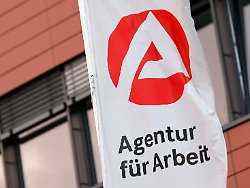Many points in traffic lights disputed
Scholz promises new citizens’ income from 2023
7/22/2022, 4:43 p.m
As early as January, the so-called citizen money should replace Hartz IV. At least that’s what the chancellor promises. But the FDP calls for some improvements, such as more sanctions. And even in the CDU, which has to agree in the Bundesrat, skepticism has prevailed so far.
Federal Chancellor Olaf Scholz has promised that Hartz IV will be replaced by the new citizens’ income next year. In Berlin, the SPD politician said that the basic income reform should “definitely” come into force on January 1st. However, the implementation remains controversial within the traffic light government. The FDP insists on the possibility of penalties for recipients of citizenship benefit if they do not participate in the job placement and urges better opportunities for additional income.
The introduction of citizen income is agreed in the coalition agreement between the SPD, the Greens and the FDP and is one of the most important socio-political projects of the traffic light. Social Minister Hubertus Heil from the SPD presented the first details on Wednesday. The conditions for the benefit recipients should therefore be less strict than the current Hartz IV.
Negotiations are now taking place within the coalition. According to Heil’s plans, the actual housing costs should be recognized and assets up to 60,000 euros should not be touched in the first two years of receiving citizen benefit. In addition, no reductions in so-called breaches of duty are planned within a six-month “period of trust”. This applies, for example, if job offers are not accepted or applications are not written as agreed. If appointments at the job center are chronically missed, there could also be sanctions during the trust period, but only for “very, very stubborn cases,” Heil said on Wednesday.
SPD insists on coalition agreement
The FDP insists on more rigor. “In the case of citizen income, there must be sanctions for breaches of duty,” said party leader Christian Lindner in an interview with ntv.de. That is double solidarity: On the one hand, society is in solidarity with the people who are currently unable to work. “On the other hand, there must be something in return: your own efforts to only make use of this solidarity from society for as long and to the extent that it is necessary,” says Lindner. Sanctions would have to set a limit for those who evade it.
FDP party vice president Johannes Vogel said on Deutschlandfunk: “There must be no freedom from sanctions, neither in half a year nor beyond.” However, he also pointed out that the subject only deals with a few cases. Nine out of ten people in basic security would never come into contact with sanctions.
The SPD rejected the criticism from the FDP. The “trust period” was agreed in the coalition agreement, said the social policy spokesman for the SPD parliamentary group, Martin Rosemann, the “Spiegel”. “I assume that the FDP is loyal to the contract.” Juso boss Jessica Rosenthal said the SPD “must not let this important reform of social policy be torpedoed by the FDP.”
According to their own statements, the Free Democrats also want to use the upcoming consultations within the traffic light to ensure that there are more additional earning opportunities for recipients of citizen income. Heil had already announced this for schoolchildren, trainees and students, and the FDP is also calling for more opportunities for adults.
The last word has also not yet been spoken on the future amount of citizen income. Social Minister Heil spoke out in favor of new calculation methods and an increase of around 40 to 50 euros compared to the current Hartz IV standard rate of 449 euros per month. Social organizations have been calling for clearer increases for a long time.
The CDU has been skeptical so far
Lindner also contradicted here. “By the way, I’m not in favor of increasing the standard rates across the board, beyond adjusting for inflation,” he told ntv.de. “Instead, we have to improve the opportunities for additional income. Citizens’ income must not become an unconditional basic income.” The specialist politician Jens Teutrine, who is responsible for citizen income in the FDP parliamentary group in the Bundestag, warned in the editorial network Germany (RND) of “incalculable costs” with a new calculation method.
It is not only within the traffic light that an agreement still has to be reached. According to Heil, the Citizens’ Income Act requires the approval of the Bundesrat. The federal states must also be brought on board. The Union is in government in more than half of the countries. Their representatives have so far been skeptical about Heil’s plans. CDU leader Friedrich Merz said on Thursday that he was “very curious to see whether there are any incentives to return to the labor market”.
CDU Vice Carsten Linnemann criticized in the “Bild” newspaper: “It can’t be that almost two million jobs in Germany are vacant and the traffic light makes work even less attractive by abolishing the principle of ‘support and demand’.” Criticism also came from employers’ president Rainer Dulger. The citizen money presented by Heil is misunderstood social justice, he said.
